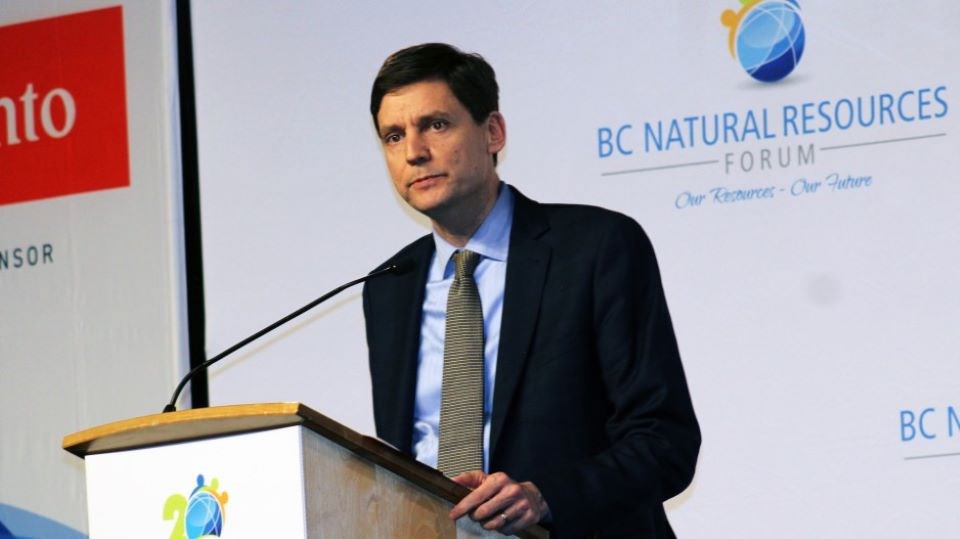Premier David Eby says the provincial government doesn’t have the legal authority to block a takeover of С����Ƶ’s Teck Resources (TSX:TECK.B, NYSE:TECK) by Swiss giant Glencore, but will be lobbying the federal government to do what it can to prevent it.
Eby weighed in on the proposed multi-billion takeover plan Tuesday, saying he worries there could be job losses in С����Ƶ and reputational damage that could put certain Teck projects at risk, like the Fording River metallurgical coal mine expansion – something Eby described as “incredibly sensitive.”
“I am incredibly concerned about this hostile takeover proposal from Glencore,” Eby told BIV News.
“Teck obviously is based here in British Columbia. It’s a significant source of corporate mining jobs, but also they are a big proponent of major projects across the province resulting in literally thousands of jobs for British Columbians.
“My first concern is that Glencore wouldn’t be as committed to operating mines, expanding mines and delivering on the critical minerals that we need for the climate transition.”
He also pointed to Glencore’s reputation, which was seriously tarnished last year when the company , and ended up paying more than US$1 billion in fines.
“I recognize we’re in a global economy here in British Columbia and we have lots of international actors, but Glencore’s record is really problematic,” Eby said.
Glencore’s play for Teck came shortly after Teck announced it would undergo a major reorganization. Under Teck’s plan, its С����Ƶ metallurgical coal mines would be spun into Elk Valley Resources Ltd., while Teck Metals Corp. would keep the company’s base metals assets, which include copper mines in С����Ƶ and Chile, a zinc mine in Alaska and a lead-zinc smelter in Trail, С����Ƶ
The split has a lot to do with environmental, social and governance (ESG) issues. ESG-minded investors who want to invest in metals like copper – critical to decarbonization – may not want the company they invest in tied to coal mines – not even those that mine coal for making steel.
Glencore has pitched an alternative to Teck's planned schism, although it too would split Teck's assets into two separate mining companies -- coal and base metals.
Glencore's original offer of US$23 billion was instantly rebuffed by Teck’s board of directors, but Glencore has continued to try to woo shareholders to consider its offer before April 26, which is when Teck’s shareholders will vote on Teck’s reorganization plan.
Under its proposal, Glencore said it would maintain an office in Canada, but hasn’t said where, raising concerns Vancouver could lose yet another major corporate head office. (The Business Council of С����Ƶ just this week published a report that notes С����Ƶ lost nine head offices since 2012.)
Both Eby and the Mining Association of С����Ƶ are concerned about Vancouver losing a major mining company.
“Teck is a homegrown Canadian success story many decades in the making,” MAС����Ƶ CEO Michael Goehring said in an open letter. “The potential loss of С����Ƶ’s long-standing mining champion and head office jobs in Vancouver is not in the best interests of British Columbians. We should be growing more local head office jobs in Vancouver, anchored by companies like Teck Resources, rather than see them go elsewhere.”
Eby said certain Teck mine projects might also be at risk, citing the Fording River coal mine expansion as one example.
Teck plans an expansion of the mine – the Castle project. Ongoing concerns about selenium pollution from coal mines in the Elk Valley in the East Kootenays, as well as impacts on First Nations rights and title, are among that concerns that led the federal government to determine the Fording River-Castle Mountain expansion would need to go through a full-blown federal environmental review.
Eby described the Fording River expansion as a delicate issue, and suggested Glencore might have a harder time earning social licence for the expansion than a Canadian offshoot of Teck.
“We’re in a very sensitive time in the Elk Valley area, with negotiations between First Nations and Teck, and Teck having to demonstrate their commitment around addressing issues like selenium pollution,” Eby said.
“Only a company like Teck, with their record and their ability to demonstrate the work that they’ve done, can bring First Nations to the table in a meaningful partnership and ensure social licence to continue there."
“To have a company like Glencore take over and put the literally thousands of jobs in that part of the province related to steel making coal at risk because of a lack of understanding of the cultural realities of operating in British Columbia, especially in this very sensitive time for that part of the province -- it’s a huge risk.”
Eby acknowledged that the province has no authority to oppose a takeover of Teck by Glencore, should Teck shareholders vote in favour of the takeover.
“The only mechanism is in the hands of the federal government…in terms of competitiveness in Canada, as well as the national interest,” he said. “And we’ll certainly be reaching out to our federal counterparts on this.”





